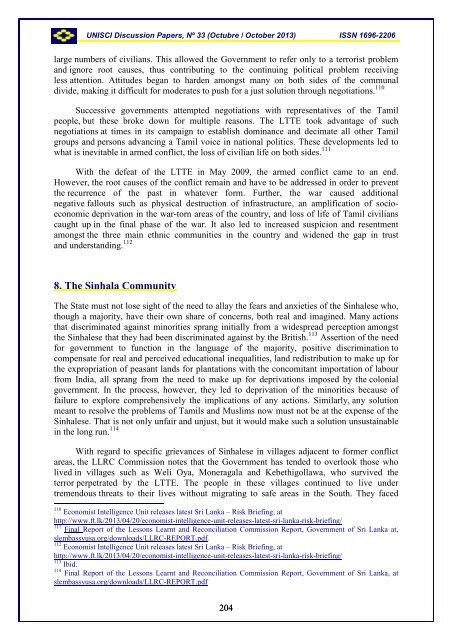UNISCI - Universidad Complutense de Madrid
UNISCI - Universidad Complutense de Madrid
UNISCI - Universidad Complutense de Madrid
Create successful ePaper yourself
Turn your PDF publications into a flip-book with our unique Google optimized e-Paper software.
<strong>UNISCI</strong> Discussion Papers, Nº 33 (Octubre / October 2013) ISSN 1696-2206large numbers of civilians. This allowed the Government to refer only to a terrorist problemand ignore root causes, thus contributing to the continuing political problem receivingless attention. Attitu<strong>de</strong>s began to har<strong>de</strong>n amongst many on both si<strong>de</strong>s of the communaldivi<strong>de</strong>, making it difficult for mo<strong>de</strong>rates to push for a just solution through negotiations. 110Successive governments attempted negotiations with representatives of the Tamilpeople, but these broke down for multiple reasons. The LTTE took advantage of suchnegotiations at times in its campaign to establish dominance and <strong>de</strong>cimate all other Tamilgroups and persons advancing a Tamil voice in national politics. These <strong>de</strong>velopments led towhat is inevitable in armed conflict, the loss of civilian life on both si<strong>de</strong>s. 111With the <strong>de</strong>feat of the LTTE in May 2009, the armed conflict came to an end.However, the root causes of the conflict remain and have to be addressed in or<strong>de</strong>r to preventthe recurrence of the past in whatever form. Further, the war caused additionalnegative fallouts such as physical <strong>de</strong>struction of infrastructure, an amplification of socioeconomic<strong>de</strong>privation in the war-torn areas of the country, and loss of life of Tamil civilianscaught up in the final phase of the war. It also led to increased suspicion and resentmentamongst the three main ethnic communities in the country and wi<strong>de</strong>ned the gap in trustand un<strong>de</strong>rstanding. 1128. The Sinhala CommunityThe State must not lose sight of the need to allay the fears and anxieties of the Sinhalese who,though a majority, have their own share of concerns, both real and imagined. Many actionsthat discriminated against minorities sprang initially from a wi<strong>de</strong>spread perception amongstthe Sinhalese that they had been discriminated against by the British. 113 Assertion of the needfor government to function in the language of the majority, positive discrimination tocompensate for real and perceived educational inequalities, land redistribution to make up forthe expropriation of peasant lands for plantations with the concomitant importation of labourfrom India, all sprang from the need to make up for <strong>de</strong>privations imposed by the colonialgovernment. In the process, however, they led to <strong>de</strong>privation of the minorities because offailure to explore comprehensively the implications of any actions. Similarly, any solutionmeant to resolve the problems of Tamils and Muslims now must not be at the expense of theSinhalese. That is not only unfair and unjust, but it would make such a solution unsustainablein the long run. 114With regard to specific grievances of Sinhalese in villages adjacent to former conflictareas, the LLRC Commission notes that the Government has ten<strong>de</strong>d to overlook those wholived in villages such as Weli Oya, Moneragala and Kebethigollawa, who survived theterror perpetrated by the LTTE. The people in these villages continued to live un<strong>de</strong>rtremendous threats to their lives without migrating to safe areas in the South. They faced110 Economist Intelligence Unit releases latest Sri Lanka – Risk Briefing, athttp://www.ft.lk/2013/04/20/economist-intelligence-unit-releases-latest-sri-lanka-risk-briefing/111 Final Report of the Lessons Learnt and Reconciliation Commission Report, Government of Sri Lanka at,slembassyusa.org/downloads/LLRC-REPORT.pdf.112 Economist Intelligence Unit releases latest Sri Lanka – Risk Briefing, athttp://www.ft.lk/2013/04/20/economist-intelligence-unit-releases-latest-sri-lanka-risk-briefing/113 Ibid.114 Final Report of the Lessons Learnt and Reconciliation Commission Report, Government of Sri Lanka, atslembassyusa.org/downloads/LLRC-REPORT.pdf204
















